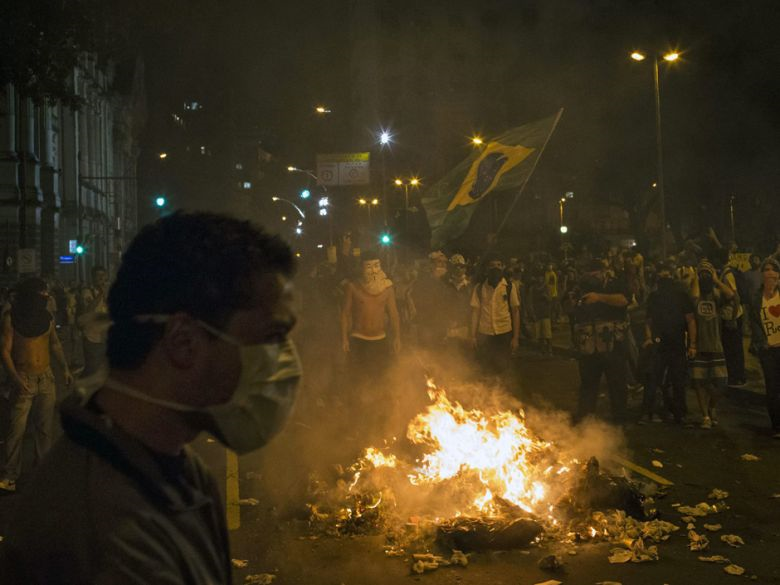RIO DE JANEIRO, BRAZIL – (Column) In Rio de Janeiro, as in São Paulo and many other large cities, the wealthy have fled to country estates, remote holiday getaway properties or beach houses to weather the viral storm in relative isolation and safety.
Meanwhile, the middle classes are hunkering down in their gated condominiums and serviced apartments. Outside, the poor are continuing life, as usual, going to work every day because they have no choice.
As an example, the first death from the virus in Rio de Janeiro was a 62-year-old domestic live-in servant, in poor health, who acquired the disease from her employer, who brought the virus from Italy to Leblon.
Mais um dia sem água aqui na Rocinha.
Mandam a população lavar as mãos direito, fazer isso fazer aquilo mas onde estão os recursos básicos? #COVID19NasFavelas pic.twitter.com/ZoMnu5mwHA— Danrley Ferreira (@Danrley) March 18, 2020
Likewise, in the country’s crowded favela communities, practicing “social distancing” or even undergoing quarantine is just not possible, especially where the schools have been closed. Most favelas also lack the infrastructure – such as a reliable running water supply – to enable residents to follow the most basic hygiene protocol of frequent handwashing.
Panic-buying and profiteering have turned other essential prophylactic measures – masks, latex gloves, and alcohol-based hand sanitizer – into scarce and expensive commodities. Containing an outbreak of Covid-19 in one of the country’s sprawling favela communities will be virtually impossible.
Reflecting the historical structural inequalities – social, spatial and racial – of Brazilian society, the poor and inadequately housed are inevitably going to bear disproportionately the brunt of Brazil’s coronavirus epidemic.
To date, the response of President Jair Bolsonaro – and by extension that of the federal government – has been at best inadequate. Likewise, his blasé attitude to personal risk and last weekend’s bizarre decision to blatantly flaunt health protocols by leaving quarantine to shake hands with his supporters can only be described as irresponsible.
Following US President Trump’s lead, President Bolsonaro has chosen to minimize (and politicize) the threat the country faces, describing the virus as a “media fantasy” and characterizing growing public fear as “hysteria.” His actions have only served to further undermine public confidence in the government and its ability to protect the citizenry from a serious public health crisis.

As witnessed by the widespread in-home “pots and pans protests” (“panelaços”) in large cities this week, there is growing anger with the President’s cavalier attitude. This backlash will only grow as fatalities mount and the uneven impact of Covid-19 becomes apparent. Despite an emerging shift in federal tone, it may be difficult to turn the tide of this public anger.
The potential for political unrest – or even outbreaks of social violence – is likely to be exacerbated by the impending global recession which analysts are already predicting will be deep and prolonged in Brazil and Latin America as a whole.
If widespread business closures, partial lockdowns or even the quarantine of entire cities (as is the case in Italy) do happen here, the impact will be felt throughout the economy for years to come. In addition, upwards of 5 million Brazilians now operate in the “gig economy”, earning their incomes through demand-driven Apps (Uber, Rappi, iFood, etc.) which offer no guarantees in the event of business declines.
The combination of a public health crisis, political instability and a lack of trust in public institutions, as well as a prolonged and severe economic recession, could be disastrous for Brazil’s fragile democracy. Outbreaks of social unrest driven by physical suffering and a deep sense of injustice are far from unimaginable.
Faced with these broader threats, the country is in desperate need of responsible leadership but also a shared sense of social responsibility. As President Trump has belatedly discovered, the coronavirus is not an ideological opponent that can be ignored or tweeted into submission.

The nation must face the reality that – far from being climatically immune – Brazil faces a series of challenges based on a unique social and political history that make it vulnerable in ways that other nations are not. For Brazil, in particular, the threat of the coronavirus should not be allowed to trigger panic or partisan selfishness but must be met with unity, a sense of shared humanity and the practice of responsible citizenship.
When the impending epidemic has run its course – however long that takes – there may be some fundamental and potentially destructive changes to the Brazilian social order. The coronavirus is about to trigger something far bigger than a health crisis.

